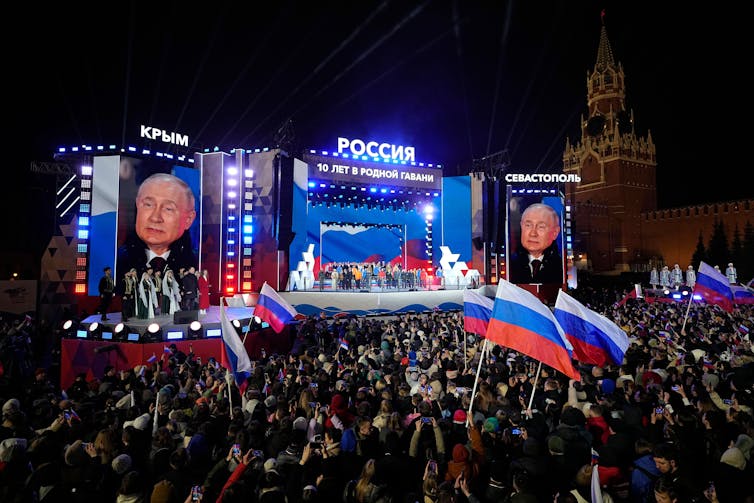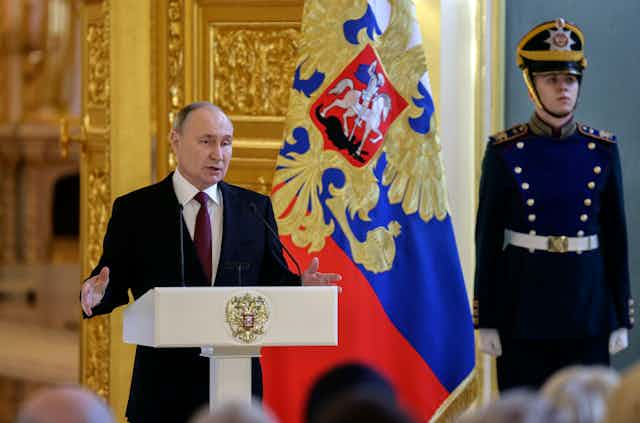When Russians went to the polls on March 17 to 19, it was less an election than an acclamation.
Putin’s margin of victory – he claimed to have won 87.21% of votes cast – was the largest in the country’s history. It put the Russian president on a par with other great post-Soviet “democrats” Ilam Karimov of Uzbekistan and Heydar Aliyev of Azerbaijan whose vote shares rarely fell below 90% Aliyev ousted Azerbaijan’s democratically elected leader Abulfaz Elchibey in a 1993 military coup and subsequently won an election with 99% of the votes.
As the respected Russia-watcher J. Paul Goode said on X (formerly Twitter), Putin’s reelection was more of a “reality show” than a real vote.
Even before voting began in Russia’s 2024 presidential election, Putin had got rid of any real opposition with Ekaterina Duntsova and Boris Nadezhdin refused entry to the ballot. The three remaining politicians nominally classed as being “opposition candidates” were there merely to provide a veneer of democratic choice. Interestingly, all said they support the war in Ukraine.
The Organisation for Security and Cooperation in Europe was denied the chance to send an international electoral observation mission. The head of Russia’s domestic election monitoring group Golos (Voice), Grigory Melkonyants, had been arrested and jailed in 2023. The group put out the following statement: “Never before have we seen a presidential campaign that fell so far short of constitutional standards.”
The fraud
Polling stations opened in occupied areas of Ukraine on March 14, a day earlier than the rest of the country. Voters there reported being coerced by government agents who visited them at home to pressure them into voting.
There was also widespread reported ballot stuffing, something that appears to be supported by (non-verified) video evidence. Mathematical analysis of the election by a respected Russian psephologist (an expert in how people vote) estimated that up to half of all votes were fraudulent.
Divergent views
International reactions were mixed. China and North Korea were quick to congratulate Putin, followed by Belarus, Venezuela and Cuba.
India, which has its own elections running from mid-April to the beginning of June, also congratulated Putin, as did Houthi rebels in Yemen and Hamas in Gaza.
Other, mainly western countries, were not so fulsome in their reaction to Putin’s electoral triumph. The UK foreign secretary, David Cameron, said in a statement that: “Putin removes his political opponents, controls the media, and then crowns himself the winner. This is not democracy.”
The French foreign ministry meanwhile said: “The conditions for a free, pluralist and democratic election were not met.” Germany’s foreign minister, Annalena Baerbock, stated that the vote “was not a real election”.
The diverse reactions to Putin’s win was to be expected. The global order is rapidly changing, with the rise of rival blocs such as the Brics (Brazil, Russia, India, China and South Africa) world is becoming multi-polar. Other countries, including Saudi Arabia, the United Arab Emirates, Egypt, Iran and Ethiopia, have been accepted as candidate members.
This is not to say that a complete realignment of global power structures is imminent. And Brics remains a talking shop of disparate states with a range of often competing aspirations. Groupings such as this aim to challenge US global hegemony rather than defeat or replace it.
Declaring Putin illegitimate
But Putin has regularly billed the invasion of Ukraine as a fight against “the west” and a defence against Nato. Many believe that the Russian president, who famously called the collapse of the Soviet Union as the “greatest geopolitical catastrophe” of the 20th century. Many believe he would use a victory in Ukraine as a launching pad for further imperial expansion.

So the decision of so many leaders in the west to declare the recent election in Russia as fraudulent and Putin as an “illegitimate” leader is an important moment in international affairs. It shows these leaders are prepared to follow the lead of the Parliamentary Assembly of the Council of Europe (Pace).
Declaring Putin illegitimate would be the final recognition that Putin is out to destroy the international order. Western states should follow Pace’s advice. In October 2023, Pace called on member states “to recognise Vladimir Putin as illegitimate after the end of his current presidential term and to cease all contact with him, except for humanitarian contact and in the pursuit of peace”.
That western governments – and their intelligence agencies – are prepared to continue to reach out – as the US did via the CIA’s warning to Russia of a possible terrorist attack which materialised in the terrible events at Crocus City Hall in Moscow at the weekend, is an example of how they might keep channels of communication open while still declaring the Putin regime to be illegitimate.
In the event, the Kremlin chose to ignore American warnings. It has even ignored claims by Isis-K that it was behind the attack in order to link it to Ukraine .
A declaration of illegitimacy would end a clear signal to Russian elites that Putin has taken Russia down a dark and dangerous path. It would also reassure those in the Russian population who are concerned about their country’s slide into dictatorship that they have not been abandoned.
As I set out in a report for the Henry Jackson Society earlier this month, a declaration of illegitimacy would allow western states to increase its support for Ukraine, close loopholes in sanctions regimes, support Russia’s neighbours and provide a haven for Russian diaspora groups to develop a plan for a democratic Russia in the future.

